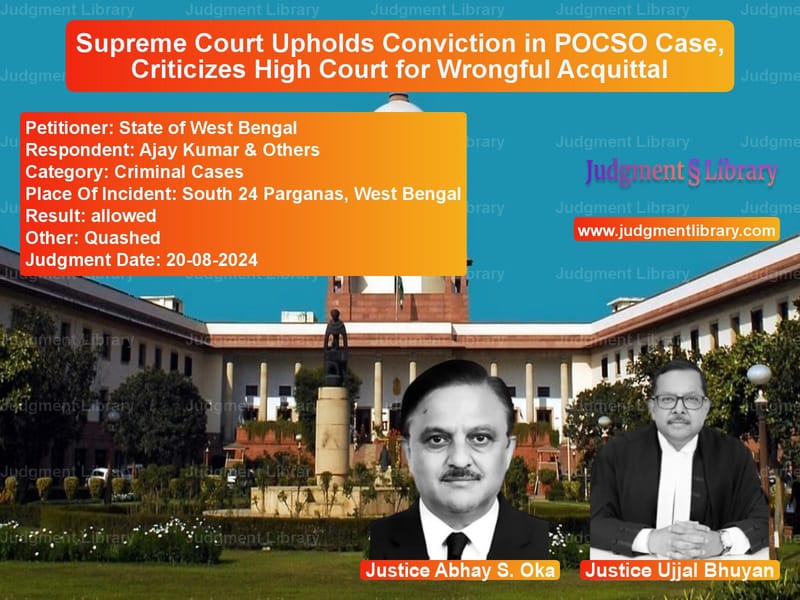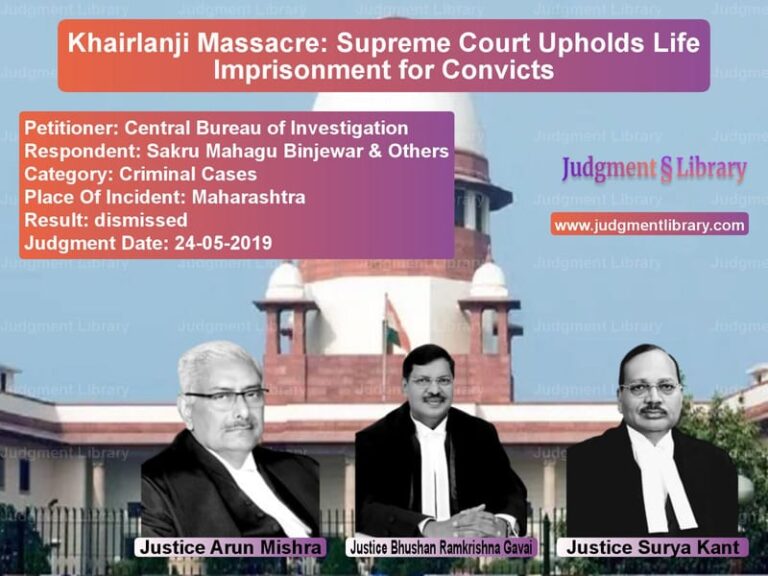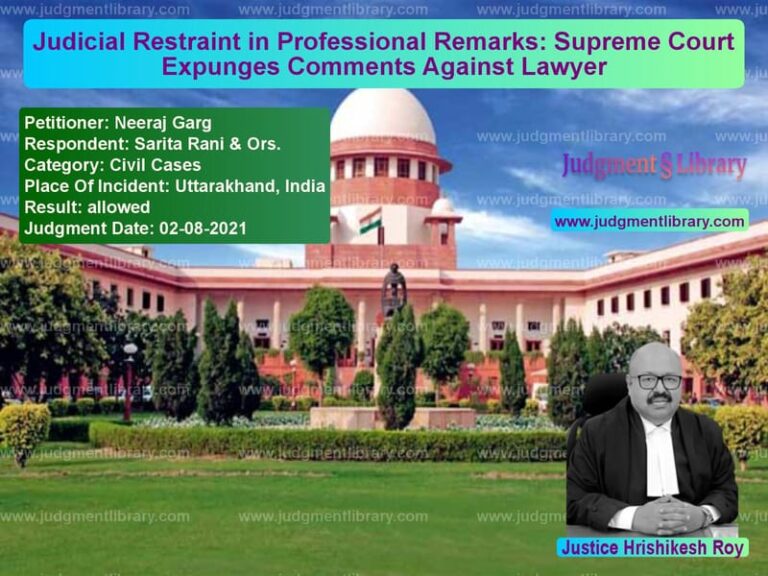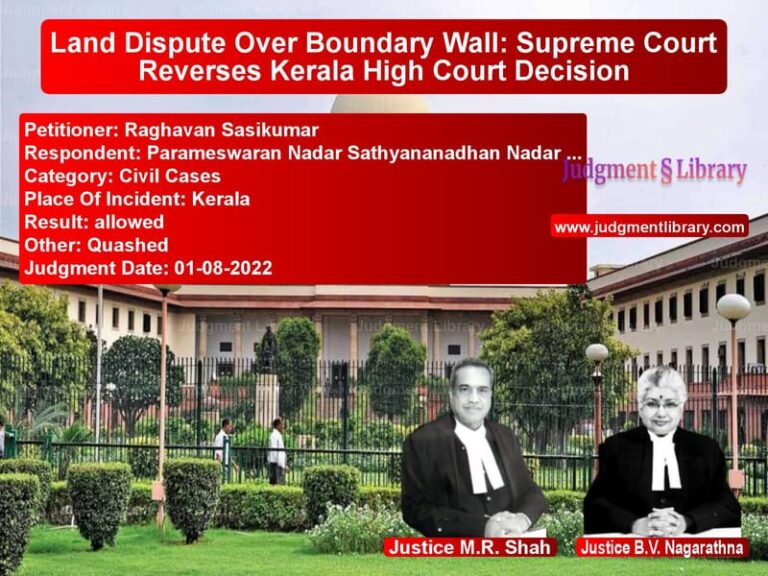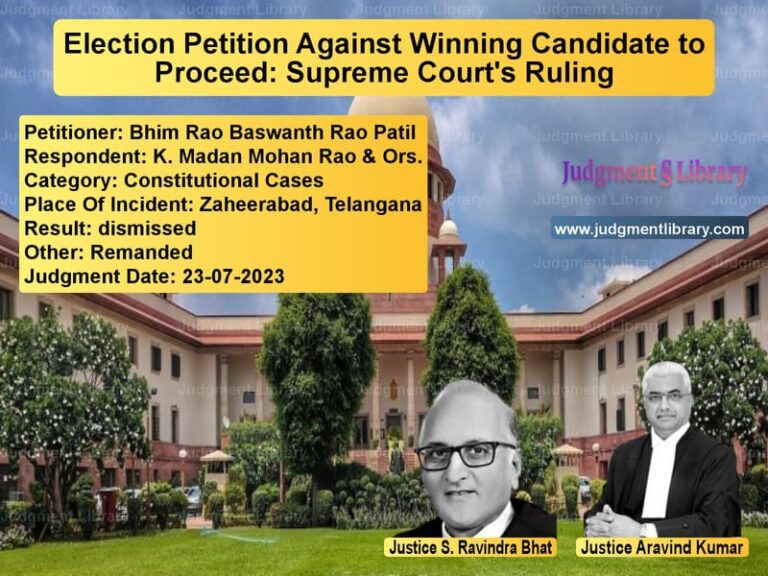Supreme Court Upholds Conviction in POCSO Case, Criticizes High Court for Wrongful Acquittal
The Supreme Court of India has set aside a controversial High Court ruling that acquitted a man convicted under the Protection of Children from Sexual Offences (POCSO) Act. The judgment emphasizes the importance of protecting minors, condemns judicial overreach, and reaffirms the statutory framework established to safeguard children from sexual abuse.
Background of the Case
The case originated in West Bengal, where the accused was convicted under Section 6 of the POCSO Act and Sections 363 and 366 of the Indian Penal Code (IPC) by a Special Judge in Baruipur. The victim, a 14-year-old girl, was allegedly abducted and sexually assaulted by the accused. Following a police complaint lodged by her mother on May 29, 2018, an investigation led to the arrest of the accused in December 2021.
Despite clear evidence, the High Court of Calcutta overturned the conviction, reasoning that the relationship between the victim and the accused was ‘non-exploitative’ and consensual. The ruling sparked widespread concern, prompting the Supreme Court to take up the matter suo motu.
Key Developments in the Case
- The accused was sentenced to 20 years of rigorous imprisonment under Section 6 of the POCSO Act, along with additional sentences for kidnapping under Sections 363 and 366 IPC.
- The High Court, in an unexpected turn, acquitted the accused, citing the victim’s willingness to cohabit with him.
- The Supreme Court intervened, questioning the legal basis of the High Court’s judgment and launching a suo motu writ petition.
Petitioner’s Arguments
The State of West Bengal and legal experts argued that:
- The High Court exceeded its jurisdiction by invoking personal opinions instead of applying the law.
- The judgment contained improper observations on adolescent relationships, ignoring the legal framework that criminalizes sexual relations with minors.
- The POCSO Act mandates strict liability, meaning a minor’s consent is irrelevant in sexual offenses.
- The delay in the investigation was immaterial, as the evidence overwhelmingly pointed to the accused’s culpability.
Respondent’s Arguments
The defense maintained that:
- The victim willingly left home and maintained a relationship with the accused.
- The High Court was justified in taking a ‘realistic’ view of the situation, acknowledging social realities.
- Criminal prosecution should not interfere with the couple’s domestic life, as they now lived together with a child.
Supreme Court’s Observations
The Supreme Court made strong observations against the High Court’s ruling, stating:
- “The findings of the High Court are perverse and against the settled principles of law.”
- “How can an act that constitutes a statutory offense under POCSO be described as ‘non-exploitative’?”
- “The High Court introduced concepts alien to the legal framework, such as ‘older adolescents’ and ‘consensual minor relationships.’”
- “A judgment should not reflect a judge’s personal philosophy but must adhere to statutory provisions.”
The Supreme Court also condemned the High Court’s discussion on social issues, sex education, and adolescent behavior, calling it “unnecessary, irrelevant, and prejudicial.”
Final Judgment
The Supreme Court reinstated the Special Judge’s conviction and held that:
- The accused remains guilty under Section 6 of the POCSO Act and Section 376(2)(n) IPC.
- The acquittal under Sections 363 and 366 IPC was upheld due to lack of sufficient evidence.
- The matter of sentencing would be considered after further deliberation on the victim’s welfare.
- The State Government was directed to provide the victim with proper rehabilitation and social support.
Impact of the Judgment
This landmark ruling clarifies that courts must strictly adhere to statutory provisions when dealing with child protection laws. It reinforces the importance of the POCSO Act in preventing child sexual abuse and ensures that judicial decisions align with legislative intent.
The judgment also underscores the necessity of safeguarding minors from social stigmatization, ensuring that victims receive proper care rather than being forced into continued cohabitation with offenders under judicial pretexts.
The Supreme Court directed all states and Union Territories to strengthen mechanisms under the Juvenile Justice Act and POCSO Act to prevent similar miscarriages of justice.
Petitioner Name: State of West Bengal.Respondent Name: Ajay Kumar & Others.Judgment By: Justice Abhay S. Oka, Justice Ujjal Bhuyan.Place Of Incident: South 24 Parganas, West Bengal.Judgment Date: 20-08-2024.
Don’t miss out on the full details! Download the complete judgment in PDF format below and gain valuable insights instantly!
Download Judgment: state-of-west-bengal-vs-ajay-kumar-&-others-supreme-court-of-india-judgment-dated-20-08-2024.pdf
Directly Download Judgment: Directly download this Judgment
See all petitions in SC/ST Act Case
See all petitions in Custodial Deaths and Police Misconduct
See all petitions in Contempt Of Court cases
See all petitions in Judgment by Abhay S. Oka
See all petitions in Judgment by Ujjal Bhuyan
See all petitions in allowed
See all petitions in Quashed
See all petitions in supreme court of India judgments August 2024
See all petitions in 2024 judgments
See all posts in Criminal Cases Category
See all allowed petitions in Criminal Cases Category
See all Dismissed petitions in Criminal Cases Category
See all partially allowed petitions in Criminal Cases Category

